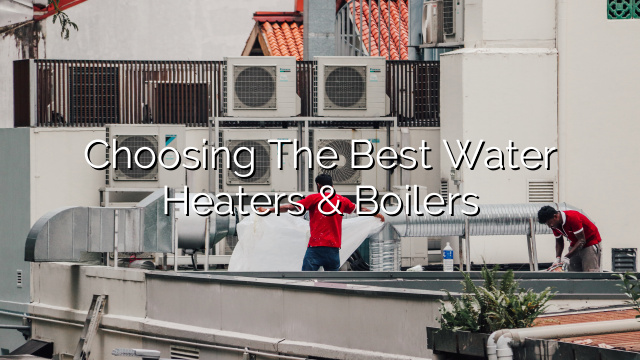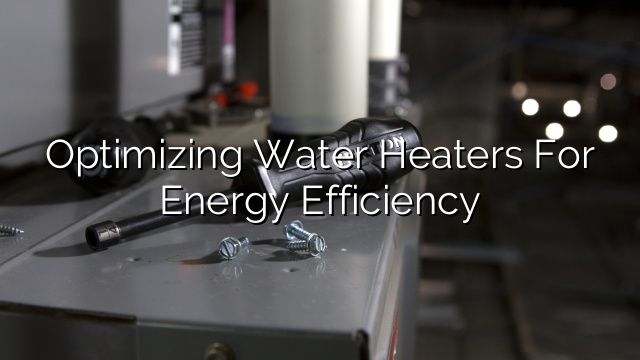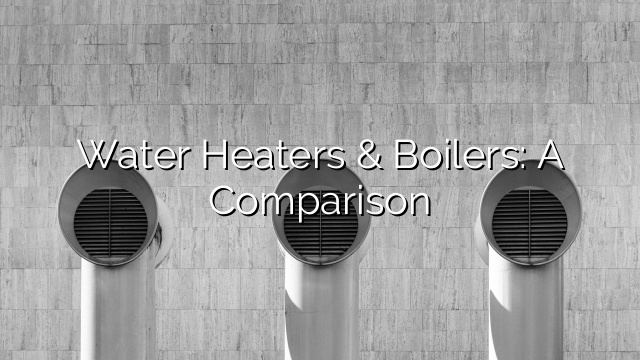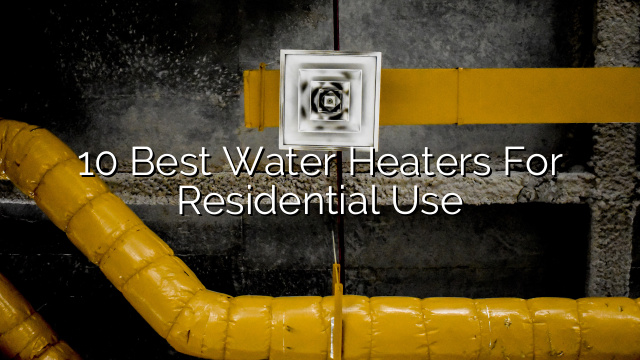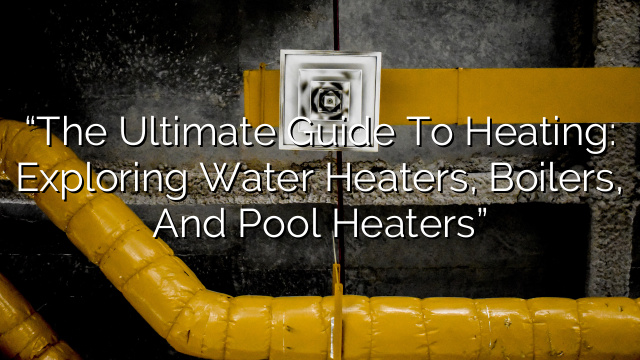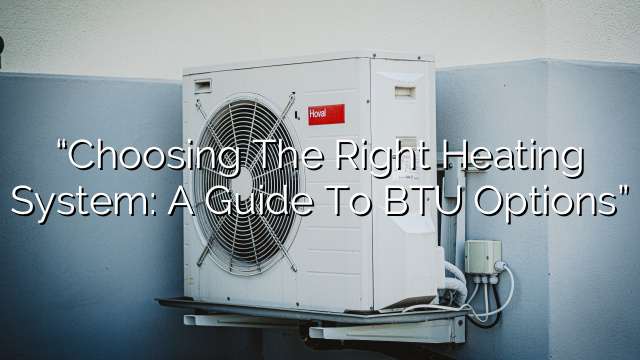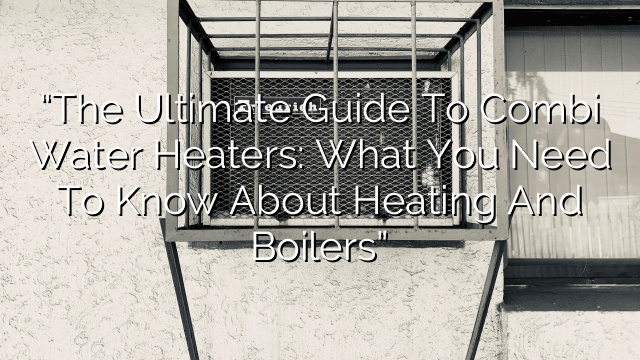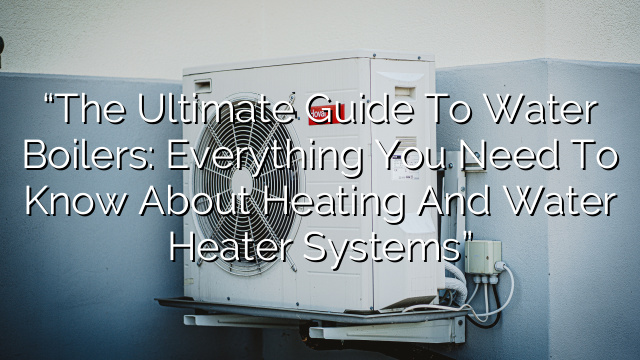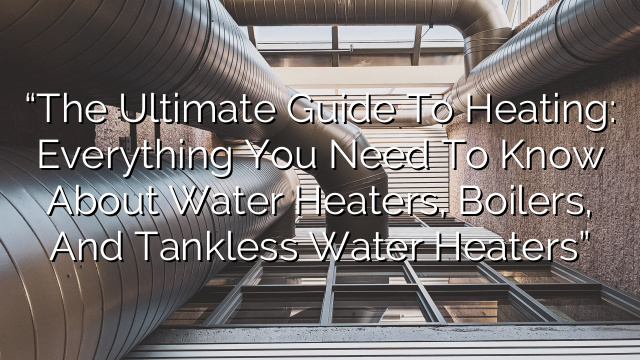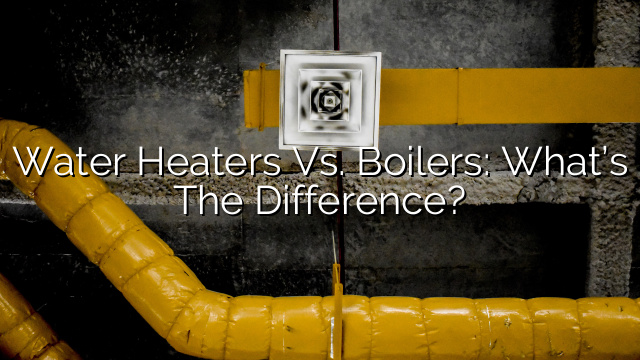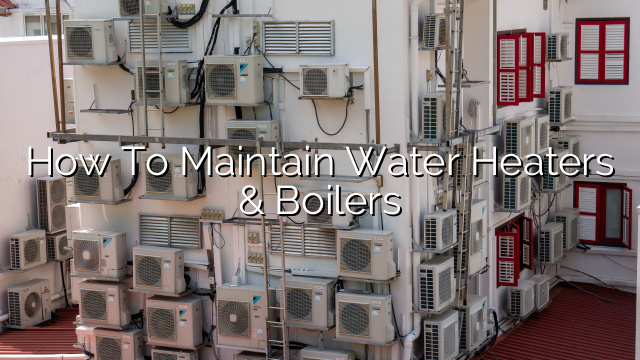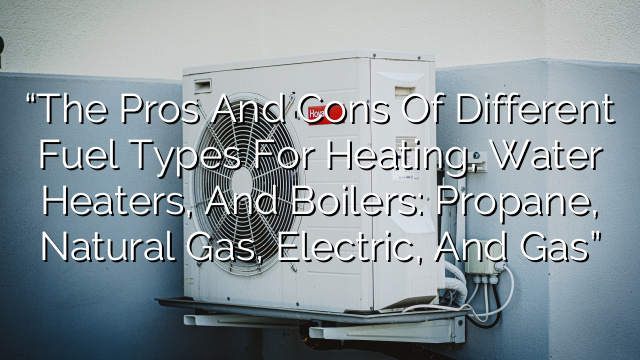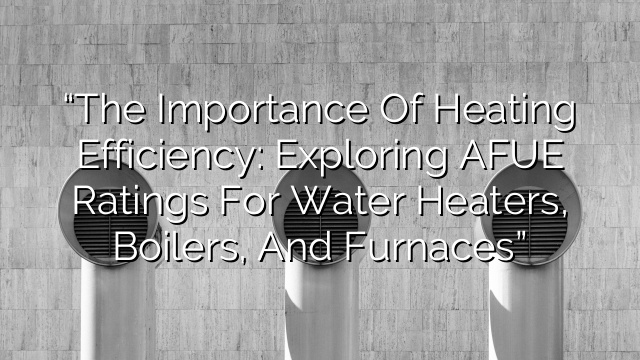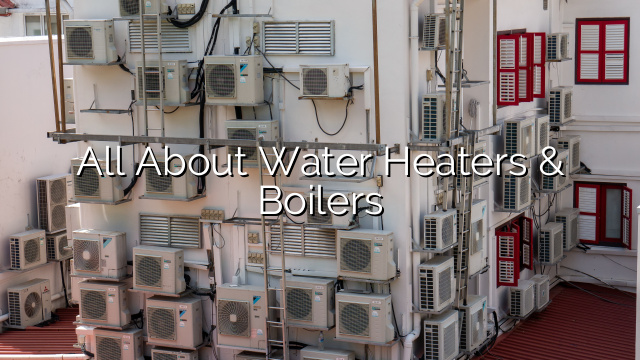When it comes to hot water, having a reliable and efficient water heater or boiler is essential. Whether you’re upgrading your current system or looking to install a brand new one, choosing the right water heater or boiler can make a significant difference in your energy bills and the comfort of your home. To help you make an informed decision, we’ve compiled a guide to help you choose the best water heaters and boilers for your needs.
1. Determine your needs and budget
Before you start looking for a water heater or boiler, it’s crucial to determine your specific needs and budget. Consider factors such as the size of your household, the number of bathrooms, and your average hot water usage. Additionally, figure out how much you’re willing to spend on the initial installation and the long-term operating costs. Understanding your requirements and financial limitations will help you narrow down your options.
2. Consider the type of water heater or boiler
There are several types of water heaters and boilers available in the market. The most common types include:
- Conventional storage tank water heaters: These are the traditional water heaters that store and heat a large amount of water in a tank. They are cost-effective but can lead to standby heat loss.
- Tankless water heaters: As the name suggests, tankless water heaters do not store hot water in a tank. Instead, they heat water on demand. They are space-saving and energy-efficient, but their initial cost is higher.
- Heat pump water heaters: These water heaters use electricity to move heat from the air or ground to heat the water. They can be expensive to install but are highly energy-efficient.
- Solar water heaters: Solar water heaters use energy from the sun to heat the water. They are environmentally friendly and can significantly reduce energy bills.
- Combination boilers: Combination or combi boilers provide both hot water and central heating. They are compact and eliminate the need for a separate water tank. However, they may not be suitable for larger households.
3. Evaluate efficiency and energy ratings
When choosing a water heater or boiler, it’s essential to consider their energy efficiency ratings. Look for products with high Energy Factor (EF) ratings or Annual Fuel Utilization Efficiency (AFUE) ratings. These ratings indicate the efficiency of the unit and its potential savings in energy consumption. Opting for an energy-efficient model can lead to considerable long-term cost savings.
4. Size and capacity
Choosing the right size and capacity is crucial to ensure that your water heater or boiler can meet your household’s hot water demands. A unit that is too small will struggle to maintain the desired temperature, while an oversized unit will waste energy. Consult with a professional installer to determine the appropriate size and capacity based on your usage patterns and household needs.
5. Consider the installation and maintenance requirements
Before making a final decision, it’s important to consider the installation and maintenance requirements of the water heater or boiler. Some systems may require specific venting or electrical requirements, while others may need regular maintenance and servicing. Understanding these factors will help you choose a unit that suits your living space and maintenance capabilities.
6. Look for warranties and customer reviews
Lastly, it’s always a good idea to check for product warranties and read customer reviews before making a purchase. Warranties can provide peace of mind and protect you from unexpected repairs or replacements. Additionally, reading reviews can give you insights into the performance and reliability of the water heaters or boilers you are considering.
Conclusion
Choosing the best water heaters and boilers for your home requires careful consideration of your needs, budget, and efficiency requirements. By following the steps outlined in this guide and consulting with a professional installer, you can make a well-informed decision that will provide you with reliable hot water for years to come.
Conclusion
Choosing the best water heaters and boilers for your home requires careful consideration of your needs, budget, and efficiency requirements. By following the steps outlined in this guide and consulting with a professional installer, you can make a well-informed decision that will provide you with reliable hot water for years to come.
Why should I check for warranties and customer reviews?
Checking for product warranties provides peace of mind and protection from unexpected repairs or replacements. Reading customer reviews can give you insights into the performance and reliability of the water heaters or boilers you are considering.
Conclusion
Choosing the best water heaters and boilers for your home requires careful consideration of your needs, budget, and efficiency requirements. By following the steps outlined in this guide and consulting with a professional installer, you can make a well-informed decision that will provide you with reliable hot water for years to come.
Why should I check for warranties and customer reviews?
Checking for product warranties provides peace of mind and protection from unexpected repairs or replacements. Reading customer reviews can give you insights into the performance and reliability of the water heaters or boilers you are considering.
Conclusion
Choosing the best water heaters and boilers for your home requires careful consideration of your needs, budget, and efficiency requirements. By following the steps outlined in this guide and consulting with a professional installer, you can make a well-informed decision that will provide you with reliable hot water for years to come.
What installation and maintenance requirements should I consider?
Before making a final decision, consider the specific installation and maintenance requirements of the water heater or boiler. Some systems may require specific venting or electrical requirements, while others may need regular maintenance and servicing. Understanding these factors will help you choose a unit that suits your living space and maintenance capabilities.
Why should I check for warranties and customer reviews?
Checking for product warranties provides peace of mind and protection from unexpected repairs or replacements. Reading customer reviews can give you insights into the performance and reliability of the water heaters or boilers you are considering.
Conclusion
Choosing the best water heaters and boilers for your home requires careful consideration of your needs, budget, and efficiency requirements. By following the steps outlined in this guide and consulting with a professional installer, you can make a well-informed decision that will provide you with reliable hot water for years to come.
What installation and maintenance requirements should I consider?
Before making a final decision, consider the specific installation and maintenance requirements of the water heater or boiler. Some systems may require specific venting or electrical requirements, while others may need regular maintenance and servicing. Understanding these factors will help you choose a unit that suits your living space and maintenance capabilities.
Why should I check for warranties and customer reviews?
Checking for product warranties provides peace of mind and protection from unexpected repairs or replacements. Reading customer reviews can give you insights into the performance and reliability of the water heaters or boilers you are considering.
Conclusion
Choosing the best water heaters and boilers for your home requires careful consideration of your needs, budget, and efficiency requirements. By following the steps outlined in this guide and consulting with a professional installer, you can make a well-informed decision that will provide you with reliable hot water for years to come.
What size and capacity should I choose?
Consult with a professional installer to determine the appropriate size and capacity based on your household’s hot water demands. Choosing a unit that is too small will struggle to maintain the desired temperature, while an oversized unit will waste energy.
What installation and maintenance requirements should I consider?
Before making a final decision, consider the specific installation and maintenance requirements of the water heater or boiler. Some systems may require specific venting or electrical requirements, while others may need regular maintenance and servicing. Understanding these factors will help you choose a unit that suits your living space and maintenance capabilities.
Why should I check for warranties and customer reviews?
Checking for product warranties provides peace of mind and protection from unexpected repairs or replacements. Reading customer reviews can give you insights into the performance and reliability of the water heaters or boilers you are considering.
Conclusion
Choosing the best water heaters and boilers for your home requires careful consideration of your needs, budget, and efficiency requirements. By following the steps outlined in this guide and consulting with a professional installer, you can make a well-informed decision that will provide you with reliable hot water for years to come.
What size and capacity should I choose?
Consult with a professional installer to determine the appropriate size and capacity based on your household’s hot water demands. Choosing a unit that is too small will struggle to maintain the desired temperature, while an oversized unit will waste energy.
What installation and maintenance requirements should I consider?
Before making a final decision, consider the specific installation and maintenance requirements of the water heater or boiler. Some systems may require specific venting or electrical requirements, while others may need regular maintenance and servicing. Understanding these factors will help you choose a unit that suits your living space and maintenance capabilities.
Why should I check for warranties and customer reviews?
Checking for product warranties provides peace of mind and protection from unexpected repairs or replacements. Reading customer reviews can give you insights into the performance and reliability of the water heaters or boilers you are considering.
Conclusion
Choosing the best water heaters and boilers for your home requires careful consideration of your needs, budget, and efficiency requirements. By following the steps outlined in this guide and consulting with a professional installer, you can make a well-informed decision that will provide you with reliable hot water for years to come.
How can I ensure energy efficiency and cost savings?
Look for water heaters or boilers with high Energy Factor (EF) ratings or Annual Fuel Utilization Efficiency (AFUE) ratings. These ratings indicate the efficiency of the unit and its potential energy savings. Choosing an energy-efficient model can lead to long-term cost savings.
What size and capacity should I choose?
Consult with a professional installer to determine the appropriate size and capacity based on your household’s hot water demands. Choosing a unit that is too small will struggle to maintain the desired temperature, while an oversized unit will waste energy.
What installation and maintenance requirements should I consider?
Before making a final decision, consider the specific installation and maintenance requirements of the water heater or boiler. Some systems may require specific venting or electrical requirements, while others may need regular maintenance and servicing. Understanding these factors will help you choose a unit that suits your living space and maintenance capabilities.
Why should I check for warranties and customer reviews?
Checking for product warranties provides peace of mind and protection from unexpected repairs or replacements. Reading customer reviews can give you insights into the performance and reliability of the water heaters or boilers you are considering.
Conclusion
Choosing the best water heaters and boilers for your home requires careful consideration of your needs, budget, and efficiency requirements. By following the steps outlined in this guide and consulting with a professional installer, you can make a well-informed decision that will provide you with reliable hot water for years to come.
How can I ensure energy efficiency and cost savings?
Look for water heaters or boilers with high Energy Factor (EF) ratings or Annual Fuel Utilization Efficiency (AFUE) ratings. These ratings indicate the efficiency of the unit and its potential energy savings. Choosing an energy-efficient model can lead to long-term cost savings.
What size and capacity should I choose?
Consult with a professional installer to determine the appropriate size and capacity based on your household’s hot water demands. Choosing a unit that is too small will struggle to maintain the desired temperature, while an oversized unit will waste energy.
What installation and maintenance requirements should I consider?
Before making a final decision, consider the specific installation and maintenance requirements of the water heater or boiler. Some systems may require specific venting or electrical requirements, while others may need regular maintenance and servicing. Understanding these factors will help you choose a unit that suits your living space and maintenance capabilities.
Why should I check for warranties and customer reviews?
Checking for product warranties provides peace of mind and protection from unexpected repairs or replacements. Reading customer reviews can give you insights into the performance and reliability of the water heaters or boilers you are considering.
Conclusion
Choosing the best water heaters and boilers for your home requires careful consideration of your needs, budget, and efficiency requirements. By following the steps outlined in this guide and consulting with a professional installer, you can make a well-informed decision that will provide you with reliable hot water for years to come.
What are the different types of water heaters and boilers?
The most common types of water heaters and boilers include:
- Conventional storage tank water heaters
- Tankless water heaters
- Heat pump water heaters
- Solar water heaters
- Combination boilers
How can I ensure energy efficiency and cost savings?
Look for water heaters or boilers with high Energy Factor (EF) ratings or Annual Fuel Utilization Efficiency (AFUE) ratings. These ratings indicate the efficiency of the unit and its potential energy savings. Choosing an energy-efficient model can lead to long-term cost savings.
What size and capacity should I choose?
Consult with a professional installer to determine the appropriate size and capacity based on your household’s hot water demands. Choosing a unit that is too small will struggle to maintain the desired temperature, while an oversized unit will waste energy.
What installation and maintenance requirements should I consider?
Before making a final decision, consider the specific installation and maintenance requirements of the water heater or boiler. Some systems may require specific venting or electrical requirements, while others may need regular maintenance and servicing. Understanding these factors will help you choose a unit that suits your living space and maintenance capabilities.
Why should I check for warranties and customer reviews?
Checking for product warranties provides peace of mind and protection from unexpected repairs or replacements. Reading customer reviews can give you insights into the performance and reliability of the water heaters or boilers you are considering.
Conclusion
Choosing the best water heaters and boilers for your home requires careful consideration of your needs, budget, and efficiency requirements. By following the steps outlined in this guide and consulting with a professional installer, you can make a well-informed decision that will provide you with reliable hot water for years to come.
What are the different types of water heaters and boilers?
The most common types of water heaters and boilers include:
- Conventional storage tank water heaters
- Tankless water heaters
- Heat pump water heaters
- Solar water heaters
- Combination boilers
How can I ensure energy efficiency and cost savings?
Look for water heaters or boilers with high Energy Factor (EF) ratings or Annual Fuel Utilization Efficiency (AFUE) ratings. These ratings indicate the efficiency of the unit and its potential energy savings. Choosing an energy-efficient model can lead to long-term cost savings.
What size and capacity should I choose?
Consult with a professional installer to determine the appropriate size and capacity based on your household’s hot water demands. Choosing a unit that is too small will struggle to maintain the desired temperature, while an oversized unit will waste energy.
What installation and maintenance requirements should I consider?
Before making a final decision, consider the specific installation and maintenance requirements of the water heater or boiler. Some systems may require specific venting or electrical requirements, while others may need regular maintenance and servicing. Understanding these factors will help you choose a unit that suits your living space and maintenance capabilities.
Why should I check for warranties and customer reviews?
Checking for product warranties provides peace of mind and protection from unexpected repairs or replacements. Reading customer reviews can give you insights into the performance and reliability of the water heaters or boilers you are considering.
Conclusion
Choosing the best water heaters and boilers for your home requires careful consideration of your needs, budget, and efficiency requirements. By following the steps outlined in this guide and consulting with a professional installer, you can make a well-informed decision that will provide you with reliable hot water for years to come.
What factors should I consider when choosing a water heater or boiler?
When choosing a water heater or boiler, there are several factors to consider:
- Your specific needs and budget
- The type of water heater or boiler
- Efficiency and energy ratings
- Size and capacity
- Installation and maintenance requirements
- Product warranties and customer reviews
What are the different types of water heaters and boilers?
The most common types of water heaters and boilers include:
- Conventional storage tank water heaters
- Tankless water heaters
- Heat pump water heaters
- Solar water heaters
- Combination boilers
How can I ensure energy efficiency and cost savings?
Look for water heaters or boilers with high Energy Factor (EF) ratings or Annual Fuel Utilization Efficiency (AFUE) ratings. These ratings indicate the efficiency of the unit and its potential energy savings. Choosing an energy-efficient model can lead to long-term cost savings.
What size and capacity should I choose?
Consult with a professional installer to determine the appropriate size and capacity based on your household’s hot water demands. Choosing a unit that is too small will struggle to maintain the desired temperature, while an oversized unit will waste energy.
What installation and maintenance requirements should I consider?
Before making a final decision, consider the specific installation and maintenance requirements of the water heater or boiler. Some systems may require specific venting or electrical requirements, while others may need regular maintenance and servicing. Understanding these factors will help you choose a unit that suits your living space and maintenance capabilities.
Why should I check for warranties and customer reviews?
Checking for product warranties provides peace of mind and protection from unexpected repairs or replacements. Reading customer reviews can give you insights into the performance and reliability of the water heaters or boilers you are considering.
Conclusion
Choosing the best water heaters and boilers for your home requires careful consideration of your needs, budget, and efficiency requirements. By following the steps outlined in this guide and consulting with a professional installer, you can make a well-informed decision that will provide you with reliable hot water for years to come.
What factors should I consider when choosing a water heater or boiler?
When choosing a water heater or boiler, there are several factors to consider:
- Your specific needs and budget
- The type of water heater or boiler
- Efficiency and energy ratings
- Size and capacity
- Installation and maintenance requirements
- Product warranties and customer reviews
What are the different types of water heaters and boilers?
The most common types of water heaters and boilers include:
- Conventional storage tank water heaters
- Tankless water heaters
- Heat pump water heaters
- Solar water heaters
- Combination boilers
How can I ensure energy efficiency and cost savings?
Look for water heaters or boilers with high Energy Factor (EF) ratings or Annual Fuel Utilization Efficiency (AFUE) ratings. These ratings indicate the efficiency of the unit and its potential energy savings. Choosing an energy-efficient model can lead to long-term cost savings.
What size and capacity should I choose?
Consult with a professional installer to determine the appropriate size and capacity based on your household’s hot water demands. Choosing a unit that is too small will struggle to maintain the desired temperature, while an oversized unit will waste energy.
What installation and maintenance requirements should I consider?
Before making a final decision, consider the specific installation and maintenance requirements of the water heater or boiler. Some systems may require specific venting or electrical requirements, while others may need regular maintenance and servicing. Understanding these factors will help you choose a unit that suits your living space and maintenance capabilities.
Why should I check for warranties and customer reviews?
Checking for product warranties provides peace of mind and protection from unexpected repairs or replacements. Reading customer reviews can give you insights into the performance and reliability of the water heaters or boilers you are considering.
Conclusion
Choosing the best water heaters and boilers for your home requires careful consideration of your needs, budget, and efficiency requirements. By following the steps outlined in this guide and consulting with a professional installer, you can make a well-informed decision that will provide you with reliable hot water for years to come.
FAQ
What factors should I consider when choosing a water heater or boiler?
When choosing a water heater or boiler, there are several factors to consider:
- Your specific needs and budget
- The type of water heater or boiler
- Efficiency and energy ratings
- Size and capacity
- Installation and maintenance requirements
- Product warranties and customer reviews
What are the different types of water heaters and boilers?
The most common types of water heaters and boilers include:
- Conventional storage tank water heaters
- Tankless water heaters
- Heat pump water heaters
- Solar water heaters
- Combination boilers
How can I ensure energy efficiency and cost savings?
Look for water heaters or boilers with high Energy Factor (EF) ratings or Annual Fuel Utilization Efficiency (AFUE) ratings. These ratings indicate the efficiency of the unit and its potential energy savings. Choosing an energy-efficient model can lead to long-term cost savings.
What size and capacity should I choose?
Consult with a professional installer to determine the appropriate size and capacity based on your household’s hot water demands. Choosing a unit that is too small will struggle to maintain the desired temperature, while an oversized unit will waste energy.
What installation and maintenance requirements should I consider?
Before making a final decision, consider the specific installation and maintenance requirements of the water heater or boiler. Some systems may require specific venting or electrical requirements, while others may need regular maintenance and servicing. Understanding these factors will help you choose a unit that suits your living space and maintenance capabilities.
Why should I check for warranties and customer reviews?
Checking for product warranties provides peace of mind and protection from unexpected repairs or replacements. Reading customer reviews can give you insights into the performance and reliability of the water heaters or boilers you are considering.
Conclusion
Choosing the best water heaters and boilers for your home requires careful consideration of your needs, budget, and efficiency requirements. By following the steps outlined in this guide and consulting with a professional installer, you can make a well-informed decision that will provide you with reliable hot water for years to come.
FAQ
What factors should I consider when choosing a water heater or boiler?
When choosing a water heater or boiler, there are several factors to consider:
- Your specific needs and budget
- The type of water heater or boiler
- Efficiency and energy ratings
- Size and capacity
- Installation and maintenance requirements
- Product warranties and customer reviews
What are the different types of water heaters and boilers?
The most common types of water heaters and boilers include:
- Conventional storage tank water heaters
- Tankless water heaters
- Heat pump water heaters
- Solar water heaters
- Combination boilers
How can I ensure energy efficiency and cost savings?
Look for water heaters or boilers with high Energy Factor (EF) ratings or Annual Fuel Utilization Efficiency (AFUE) ratings. These ratings indicate the efficiency of the unit and its potential energy savings. Choosing an energy-efficient model can lead to long-term cost savings.
What size and capacity should I choose?
Consult with a professional installer to determine the appropriate size and capacity based on your household’s hot water demands. Choosing a unit that is too small will struggle to maintain the desired temperature, while an oversized unit will waste energy.
What installation and maintenance requirements should I consider?
Before making a final decision, consider the specific installation and maintenance requirements of the water heater or boiler. Some systems may require specific venting or electrical requirements, while others may need regular maintenance and servicing. Understanding these factors will help you choose a unit that suits your living space and maintenance capabilities.
Why should I check for warranties and customer reviews?
Checking for product warranties provides peace of mind and protection from unexpected repairs or replacements. Reading customer reviews can give you insights into the performance and reliability of the water heaters or boilers you are considering.
Conclusion
Choosing the best water heaters and boilers for your home requires careful consideration of your needs, budget, and efficiency requirements. By following the steps outlined in this guide and consulting with a professional installer, you can make a well-informed decision that will provide you with reliable hot water for years to come.

